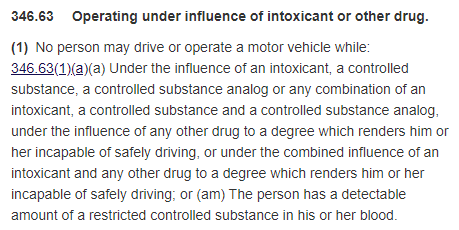
Wisconsin Statute 346.63a Explained
Below is a distilled and simplified explanation of Wisconsin Statute 346.63a, which is listed below:

What This Means
The abbreviation “OWI” is most frequentlyused to describe drunk driving in Wisconsin. The abbreviation stands for “operating while intoxicated,” and most people associate that with alcohol. However, you can be charged with OWI for driving under the influence of not just alcohol, but also drugs and other intoxicants.
These days, it’s not uncommon for law enforcement to arrest someone for OWI by mistake. Many substances, including over-the-counter and prescription medications, can cause intoxication. Simple lack of sleep or other health problems can also have effects similar to intoxication.
To provide guidance on Wisconsin statute 346.63a, we’ve compiled information about drugs and intoxicating substances.
Operating Under Influence of an Intoxicant or Other Drug
Wisconsin law makes it illegal to operate a motor vehicle while under the influence of any of the following:
• Intoxicants
• Controlled substances
• Substances that mimic controlled substances (analogs)
• Any other drug that affects driving
• Any combination of the above
What Is an Intoxicant?
Though Wisconsin statute doesn’t specifically define this term, it includes any substance that can produce intoxicating effects. This can include alcohol, illegal drugs, or legal, prescription drugs. When law enforcement reports that they identified the odor of an intoxicant, they usually mean the smell of alcohol or marijuana, but intoxicants can include alcohol, illegal drugs, or legal, prescription drugs.
What is a Controlled Substance?
Controlled substances are illegal drugs, specifically drugs listed in the Uniform Controlled Substances Act, Chapter 961. There are hundreds of substances listed in the Act, and all are deemed to have detrimental effects on health and welfare. These can include commonly known drugs like heroin, cocaine, and methamphetamines. They can be in any form, such as powders, pills, or liquids.
Is Possessing Controlled Substances Illegal?
Not all substances listed in Chapter 961 are illegal in certain circumstances. Some are prescription drugs. It is not illegal to possess prescription controlled substances as long as you have a written prescription and purchased them legally.
What Is a Controlled Substance Analog?
A controlled substance analog is a substance that mimics a controlled substance and can be referred to as “designer drugs.” They are similar in structure and pharmacology to Schedule I or II drugs. They are also marketed as producing similar effects, and they are not approved for medical use. Examples of these designer drugs include substances like synthetic cannabinoids or bath salts.
Combining Substances
Some over-the-counter and prescription drugs advise you not to take them with alcohol as it can amplify their effects. This is known as a “synergistic effect,” meaning the drugs in combination with alcohol will bring on impairment more quickly and substantially than if they were taken on their own. One beer may feel like three beers very quickly.
We take pride in a track record of favorable outcomes in OWI cases at Tracey Wood & Associates. We credit that success to our relentless support of our clients. Our clients have hope for their futures because they know we’re standing on their side.
Start fighting your charges today by scheduling a free, no-obligation online consultation.
Featured in The Media




Call 1-888-597-3622 or Schedule a Free Case Evaluation Online


